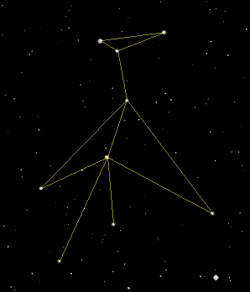
We still hadn't decided on a boy's name when Ginny went into labor. We
had picked Alexander as the middle name in case it was a boy, but we
didn't think that we wanted to call him Alexander all the time. So we were
trying to find a more unique first name--something with some meaning and
history--but after looking through a book of 30,000 baby names we still
couldn't decide on one. We had thought that Phoenix was a pretty cool
name, but decided that we didn't want people to think his name was Felix,
so we had given up on the Phoenix idea.
On the last day in the hospital we were told by the nurse that we had
to have a name before we left because they had a lot of forms they needed
to fill out. By then we had decided that he did seem like an Alexander
after all, so we would go ahead and call him that. The trouble was that
not many names fit with Alexander as the first name--it generally flowed
better as a second name. At the last minute we remembered the Phoenix idea
and decided that we could go ahead and make that his first name if we were
going to call him Alexander anyway. So, Phoenix Alexander it was, and so
it shall remain. Subsequently, however, we have decided that we prefer
to call him Phoenix after all!
Phoenix
( ) )

The phoenix was a legendary bird originating in Egyptian mythology.
The Egyptian name for the bird was 'bennu.' The Greek 'phoinix' ( )
comes from Herodotus' work on Egypt, circa 430 B.C.E.
'Phoenix,' in turn, is the Roman spelling from the Greek. The figure to
the right is the hieroglyph of the bennu bird found in the Papyrus of Ani (a
copy of the Egyptian Book of the Dead). Egyptian texts don't give a very
developed tail of the bennu--not even including the consumation by fire.
The story was embellished by later writers well into the Common Era until
it picked up all of the details with which we are familiar. )
comes from Herodotus' work on Egypt, circa 430 B.C.E.
'Phoenix,' in turn, is the Roman spelling from the Greek. The figure to
the right is the hieroglyph of the bennu bird found in the Papyrus of Ani (a
copy of the Egyptian Book of the Dead). Egyptian texts don't give a very
developed tail of the bennu--not even including the consumation by fire.
The story was embellished by later writers well into the Common Era until
it picked up all of the details with which we are familiar.
The phoenix was a unique bird (there was only one phoenix in existence at
any given time) that lived for 400 to 500 years in the Arabian
desert. As the end of its life drew near it built a funeral pyre for
itself out of herbs and spices. It then lay itself to rest and began to
sing a beautiful song. The pyre was then ignited by the sun and bird and
nest were consumed in flame. From the ashes a new phoenix was born. The
young phoenix, escorted by a throng of birds, would then carry the
remains of its parent to Heliopolis, on the Nile, and bury it in the
temple of the sun.
The phoenix was always associated with the Sun. The bennu bird was
considered to be the soul of Re, the Sun god. (Heliopolis, in fact,
means "city of the Sun.") In many ancient texts it is seen accompanying
the sun in its trek across the sky. The phoenix has also long been a
symbol for resurrection. Some sources associate it with Osiris, the god
of resurrection.
According to the Oxford English Dictionary, the word phoenix was used
figuratively in Late Middle English (late 14th and early 15th centuries)
to mean "A person or thing of unique excellence or of matchless beauty;
a paragon."
Alexander
( ) )
Alexander is an ancient Greek name which generally means "defender of
humanity." The Greek word alexandros literally means "defending
men"--a compound of alexo ( , to defend, to ward off) and
andros ( , to defend, to ward off) and
andros ( , man). The root of alexo is ALK, from which
Greek words such as alkar ( , man). The root of alexo is ALK, from which
Greek words such as alkar ( , a safeguard or defense) and
alkter ( , a safeguard or defense) and
alkter ( , a defender) were derived. , a defender) were derived.
| 